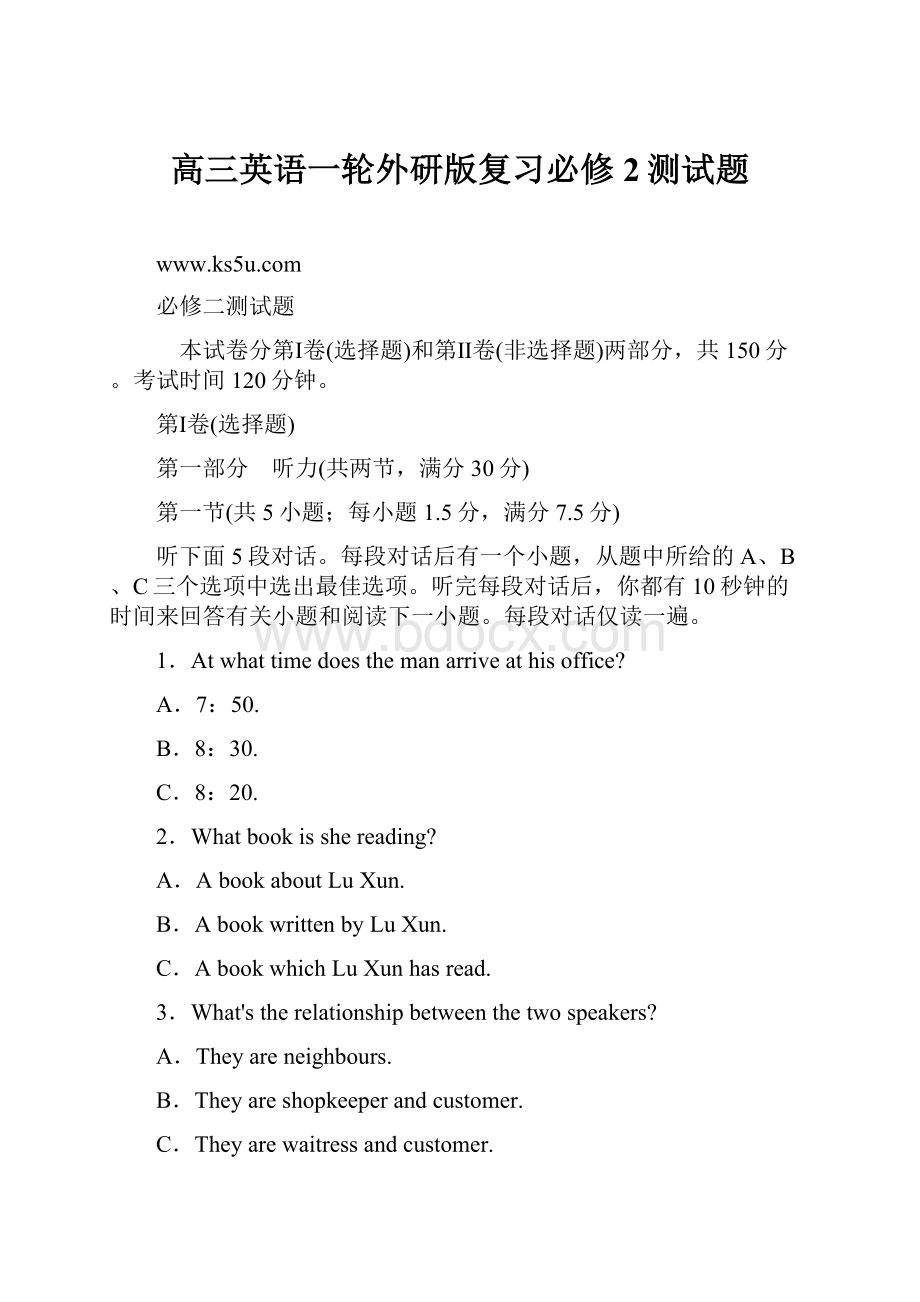高三英语一轮外研版复习必修2测试题.docx
《高三英语一轮外研版复习必修2测试题.docx》由会员分享,可在线阅读,更多相关《高三英语一轮外研版复习必修2测试题.docx(29页珍藏版)》请在冰豆网上搜索。

高三英语一轮外研版复习必修2测试题
必修二测试题
本试卷分第Ⅰ卷(选择题)和第Ⅱ卷(非选择题)两部分,共150分。
考试时间120分钟。
第Ⅰ卷(选择题)
第一部分 听力(共两节,满分30分)
第一节(共5小题;每小题1.5分,满分7.5分)
听下面5段对话。
每段对话后有一个小题,从题中所给的A、B、C三个选项中选出最佳选项。
听完每段对话后,你都有10秒钟的时间来回答有关小题和阅读下一小题。
每段对话仅读一遍。
1.Atwhattimedoesthemanarriveathisoffice?
A.7:
50.
B.8:
30.
C.8:
20.
2.Whatbookisshereading?
A.AbookaboutLuXun.
B.AbookwrittenbyLuXun.
C.AbookwhichLuXunhasread.
3.What'stherelationshipbetweenthetwospeakers?
A.Theyareneighbours.
B.Theyareshopkeeperandcustomer.
C.Theyarewaitressandcustomer.
4.Whatarethetwospeakerstalkingabout?
A.Anappointmentwiththedoctor.
B.Buyingsomethinginashop.
C.Havingdinnerinarestaurant.
5.Howwillthemantravel?
A.Bytrain.
B.Byship.
C.Byair.
第二节(共15小题;每小题1.5分,满分22.5分)
听下面5段对话或独白。
每段对话或独白后有几个小题,从题中所给的A、B、C三个选项中选出最佳选项。
听每段对话或独白前,你将有时间阅读各个小题,每小题5秒钟;听完后,各小题将给出5秒钟的作答时间。
每段对话或独白读两遍。
听第6段材料,回答第6、7题。
6.Whoisthewomanprobablytalkingto?
A.AmanfromEngland.
B.AmanfromNewYork.
C.AmanfromJapan.
7.Whatdoestheman'sfrienddo?
A.She'sadoctor.
B.She'sanurse.
C.She'sababy�sitter.
听第7段材料,回答第8、9题。
8.Whatwilltheydotogether?
A.Havelunch.
B.Havesupper.
C.Haveadrink.
9.Whenwilltheymeet?
A.At12:
13onTuesday.
B.At12:
30tomorrow.
C.At12:
30onThursday.
听第8段材料,回答第10至12题。
10.Wherearethetwospeakers?
A.Inahotel.
B.Atarestaurant.
C.Inapany.
11.Whattimeistheappointment?
A.9:
30.
B.10:
30.
C.11:
40.
12.Where'sMrBlack'sroom?
A.Nextdoor.
B.Onthenextfloor.
C.Twodoors'away.
听第9段材料,回答第13至16题。
13.Whywasthewomanlate?
A.Becauseofherwork.
B.Becauseofthetraffic.
C.Becauseofherheadache.
14.Whatdoesthewomando?
A.Sheisanofficeworker.
B.Sheisabusdriver.
C.Sheisafarmer.
15.Wherearetheygoingtotakeawalk?
A.Alongtheroad.
B.Alongtheriver.
C.Alongthelake.
16.Whatwilltheydothen?
A.Havedinneratarestaurant.
B.Haveadrinkatapub.
C.Haveapicnicintheopenair.
听第10段材料,回答第17至20题。
17.WhydidMrFinchbuytheoldhousenearthesea?
A.Hewantedtospendhissummerholidaysthere.
B.Hewantedtoleadaquietlife.
C.Hewantedtoearnmoneybyshowingtouristsaroundthehouse.
18.Whydidthetouristsetoseethehouse?
A.Becauseitwastheoldestinthevillage.
B.Becauseitwasinverygoodcondition.
C.Becauseitwasaninterestingone.
19.WhydidMrFinchputthenoticeinthewindow?
A.Hewantedtomakemoney.
B.Hewantedtoattractmorevisitors.
C.Hewantedtostopthevisitors.
20.WhatdidMrFinchdothen?
A.Heboughtanotheroldhouse.
B.Heboughtamodernhouse.
C.Helivedinanotherinterestingplace.
答案:
1.C 2.B 3.C 4.A 5.C 6.C 7.B 8.A 9.C
10.C 11.B 12.A 13.A 14.A 15.C 16.B 17.B 18.C 19.C 20.B
听力材料
(Text1)
W:
Whendoyouusuallygotowork?
M:
Iusuallyleavemyhouseat7:
50.Ittakesmeabouthalfanhourtogettomyoffice.
(Text2)
M:
Whatareyoureading?
W:
I'mreadingabookonwritingbyLuXun.
(Text3)
W:
Goodafternoon.
M:
Goodafternoon.IhaveatablefortwounderthenameofBlack.
W:
Yes,sir.Wouldyouethisway?
Willthistabledoforyou?
M:
That'llbefine.
(Text4)
M:
Iwonderwhetherthedoctorcouldseemeearlytomorrow.
W:
I'mafraidnotbeforemidday.
M:
Howabout12:
45?
W:
Sorry,butthat'staken,too.
(Text5)
W:
Haveyougotyourtrainticketyet?
M:
No,wefinallydecidedtoflythere.
(Text6)
W:
Whatdoesyourfrienddoforaliving?
M:
Sheisoneofthosepersonswholookafterpeopleinahospital.
W:
Oh,Isee.Sheisanurse,youmean.
M:
Yes.That'sthewordIwaslookingfor.Myvocabularyisratherpoor,I'mafraid.
W:
Nevermind.Youexplainedthatverywell.
(Text7)
M:
Look,Iwantedtoaskyou.Iwonderifyoucouldeouttolunchwithmesomeday.
W:
Yes,I'dliketoverymuch.
M:
Howabouttomorrow?
W:
I'mafraidI'mtieduptomorrow.
M:
WhataboutThursdaythen?
W:
Justaminute.Letmesee.Yes,Thursdaywouldbefine.
M:
Good.Let'smeethere,shallwe?
W:
Whattime?
M:
Wouldtwelvethirtybeallright?
W:
Yes,thatwillbefine.
(Text8)
M:
Goodmorning.CanIseeMrBlack,please?
W:
Haveyouanappointment?
M:
Yes,athalfpastten.
W:
What'syourname,please?
M:
Lightfoot,DavidLightfoot.
W:
Ah,yes.MrBlackisexpectingyou.Thisway,please.MrBlack'sroomisnextdoor.
(Text9)
W:
Hello,I'msorryI'mlate.ThereweresomelettersIhadtofinishattheoffice.
M:
That'sallright.I'veonlyjustarrivedmyself.Now,whatarewegoingtodo?
Doyoufeellikeabitoffreshair?
Howaboutgoingforawalkbythelake?
W:
Yes,Iwouldn'tmindthat.Beingattheofficealldaylonghasgivenmeaheadache.Wecouldstopatthepubonthewayback.
(Text10)
WhenMrFinchretired,heboughtasmallhouseinavillagenearthesea.Thehousewasbuiltin1588,butwasinverygoodcondition.MrFinchexpectedtohaveaquietlife,butinthesummerholidayshegotashock.Hundredsofpeoplecametothevillage.MrFinch'shousewasthemostinterestingbuildinginthevillageandmanypeoplecametoseeit.Frommorningtillnighttherewerevisitorsoutsidethehouse.TheykeptlookingthroughwindowsandmanyofthemevenwentintoMrFinch'sgarden.ThiswastoomuchforMrFinch.Hedecidedtodrivethevisitorsaway.Soheputanoticeinthewindow.Thenoticesaid:
Ifyouwanttosatisfyyourcuriosity,einandlookaround.Price:
twoshillingsandsixpence.MrFinchwassurethatvisitorswouldstoping,buthewaswrong.MoreandmorevisitorscameandMrFinchspenteverydayshowingthemroundhishouse.“Icameheretoretire,nottoworkasaguide.”Hesaidangrily.Intheend,hesoldthehouseandboughtasmall,modernone.Itisanuninterestinglittleplaceandnoonewantstoseeit.Buthecouldliveaquietlife.
第二部分 阅读理解(共两节,满分40分)
第一节(共15小题;每小题2分,满分30分)
阅读下列短文,从每题所给的四个选项(A、B、C和D)中,选出最佳选项,并在答题卡上将该项涂黑。
A
(2015·黑龙江哈三中三模)
Twonewstudiessuggestthatmodernrunningshoescouldincreasetheriskofinjuriestorunners.
Onestudyinvolvedsixty�eighthealthyyoungwomenandmenwhoranatleasttwenty�fourkilometersaweek.Therunnerswereobservedonatreadmillmachine(跑步机).Sometimestheyworerunningshoes.Othertimestheyranbarefoot(赤脚).
ResearchersfromtheJKMTechnologiespanyinVirginia,theUniversityofVirginiaandtheUniversityofColoradodidthestudy.
Theyfoundthatrunningshoescreatemorestressthatcoulddamageknees,hipsandanklejointsthanrunningbarefoot.Theyobservedthattheeffectwasevengreaterthantheeffectreportedearlierforwalkinginhighheels.
ThestudyappearedintheofficialscientificjournalofTheAmericanAcademyofPhysicalMedicine.
TheotherstudyappearedinthejournalNature.ItparedrunnersintheUnitedStatesandKenya.TheresearcherswerefromHarvardUniversityinMassachusetts,MoiUniversityinKenyaandtheUniversityofGlasgowinScotland.
Theydividedtherunnersintothreegroups.Onegrouphadalwaysrunshoeless.Anothergroupbadalwaysrunwithshoes.Andthethirdgrouphadchangedtoshoelessrunning.
Runnerswhowearshoesusuallyedowntheirheelfirst.Thatputsgreatforceonthebackofthefoot.Butthestudyfoundthatbarefootrunnersgenerallylandonthefrontormiddleoftheirfoot.Thatwaytheyeaseintotheirlandingandavoidstrikingtheirheel.
Harvard'sDanielLiebermanledthestudy.Hesaysthewaymostrunningshoesaredesignedmayexplainwhythosewhowearthemlandontheirheel.Theheeloftheshoeisbiggerandheavierthanotherpartsoftheshoe,soitwouldseemmorelikelytoedownfirst.Also,theheelgenerallyhasthickmaterialunderittosoftenlandings.
Buttheresearchersdonotsuggestthatrunnersimmediatelystartrunningbarefoot.Theysayittakessometraining.Andtherecanberisks,likerunningwhenyourfeetaretoocoldtofeelifyougetinjured.
ThestudywaspartlysupportedbyVibrato,whichmakesakindoffootwearthatitsaysislikerunningbarefoot.Thefindingshavegottenalotofattention.Buttheresearcherssaytherearemanyproblemsinthewaythepresshasreportedintheirpaper.SotheyhavetriedtoexplaintheirfindingsonaHarvardWebsite.
语篇解读:
本文是一篇说明文。
一项新的研究表明,穿着跑鞋跑步其实对身体并不好,赤脚跑步反而可以在一定程度上避免奔跑带来的损伤。
21.What'sthemainideaofthepassage?
A.Walkinginhighheelscouldcauselessseriouseffectsthanrunningbarefoot.
B.Twonewdiscoveriesencouragepeopletoruninhighheels.
C.Runninginshoesispartlygoodtorunners.
D.Twonewstudiesproverunningwithoutshoesislessriskytorunnersinmostcases.
答案:
D 主旨大意题。
第一段“Twonewstudiessuggestthatmodernruningshoescouldincreasetheriskofinjuriestorunners。
”点出了文章的主题:
穿跑鞋跑步会增加受伤的风险。
在下文的试验中多次提到赤脚跑步的损伤较小。
由此可推断本文的主旨大意是赤脚跑步对运动员来说风险较小。
故选D项。
22.Whichpartofourbodycouldbeinjuredifweruninrunningshoes?
A.Toes. B.Hips.
C.Feet.D.Legs.
答案:
B 细节理解题。
根据第四段第一句“Theyfoundthatrunningshoescreatemorestressthatcoulddamageknees,hipsandanklejointsthanrunningbarefoot.”可知,应选B项。
23.Whatcanwelearnfromthepassage?
A.Thewaythatwerunbylandingonthefrontormiddleofourfootcouldavoiddamagingourheel.
B.Weshouldstartrunningbarefootinnotime.
C.Runninginmodernrunningshoescouldcausemoreseriouseffectsthanrunninginhighheels.
D.Wewon'tbeinjuredifwerunbarefoot.
答案:
A 推理判断题。
根据第八段第三至四句“Butthestudyfoundthatbarefootrunnersgenerallylandonthefrontormiddleoftheirfoot.Thatwaytheyeaseintotheirlandingandavoidstrikingtheirheel.”可知,赤脚跑步是前脚掌先落地,这样可以避免给脚后跟造成更多的压力。
故A项正确。
24.Whatisthewriter'sattitudetowardtheuseofthemodernrunningshoes?
A.Persuasive.B.Negative.
C.Objective.D.Supportive.
答案:
C 推理判断题。
通篇文章作者都在引用研究结果和专家意见,故只是在客观陈述事实,而没有发表个人意见。
故选C项。
B
Christmas,Easterandbirthdaypartiescanbedifficulttimesforgrandmothersandparentsastheyrus